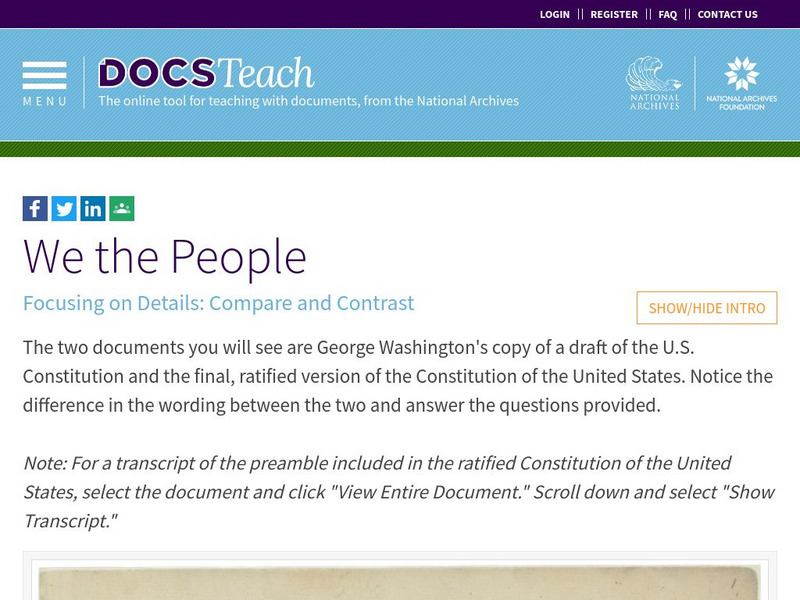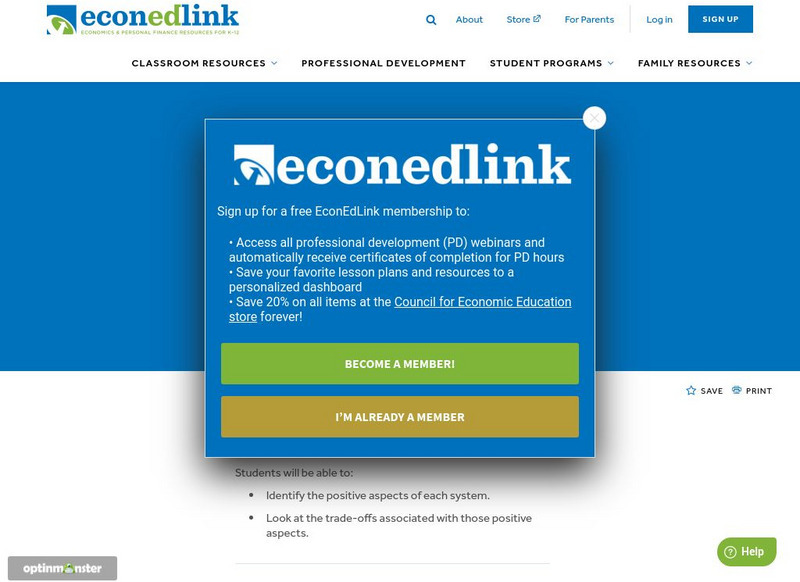Hi, what do you want to do?
US National Archives
Docsteach: We the People
In this activity, students will examine the original and final drafts of the Constitution and evaluate the significance of the selection of the words 'We the People.'
Center For Civic Education
Center for Civic Education: What Basic Ideas in the Preamble to the Const [Pdf]
This lesson explores some ideas in the Preamble to the Constitution. Students learn the importance of the words, We the People. The lesson emphasizes that the power to govern belongs to the people who have created the government to...
Center For Civic Education
Center for Civic Education: We the People: Constitution Day Pdf [Pdf]
This teachers guide has activities for Constitution Day.
Broward Education Foundation
Broward Education Foundation: I Belong, You Belong, We Belong [Pdf]
The students begin with sharing their attributes. The students then work on their family diary, which is a home/school connection. Students will then learn about their city and state. Students will draw a map of their community first and...
Louisiana Department of Education
Louisiana Doe: Louisiana Believes: English Language Arts: Grade 6: Out of the Dust
Focused on the Dust Bowl and how families fought for a meaningful existence and survival, this unit will offer students different perspectives on how people respond to adversity, the lessons that can be learned from hardship and failure,...
Utah Education Network
Uen: We Are Alike and We Are Different
Lesson that helps young scholars understand the features that make people alike and different. Students to create a paper face and a paper face book.
Council for Economic Education
Econ Ed Link: The Price We Pay for Health: Us and Canada
Students will review the health systems of United States and Canada. They will identify the positive aspects of each system. They will look at the trade-offs associated with those positive aspects. In Canada, everyone has health care,...
University of Nebraska Omaha
University of Omaha: Why We Save [Pdf]
Why do people need to save money? This lesson plan is geared for Kindergarten through 2nd grade and helps students understand the reasons for saving.
National Endowment for the Humanities
Neh: Edsit Ement: Civil Rights Movement
This lesson on the Civil Rights movement is organized into three sections: "Identifying the Need for Change," "Ordinary People in the Civil Rights Movement," and "Historic Places in the Civil Rights Movement."
NBC
Nbc Learn: Chance Discoveries: Lab Experiments, Unexpected Results
Many (if not most) experiments in the chemistry lab do not get significant results - or the expected results. For this Chemistry Now original video series, we highlight the curiosity, daring, and creativity of the best bench chemists by...
Council for Economic Education
Econ Ed Link: Hawaiian Economics: From Mountains to Sea
This economics lesson plan integrates the history of the Hawaiian people with geography, natural resources, good and services and more. "In this lesson, we will learn how Hawaiians shared their island resources long ago."
Library of Congress
Loc: How Transportation Transformed America: Going to Market
This project investigates and examines the impact transportation has had on peoples' lives. We chose to compare and contrast the turn of the centuries. This instructional activity introduces primary documents, specifically visuals. We...
Childnet
Childnet: Online Safety: Being Smart With Your Smartphone
The lesson is designed for teachers to use with 8-11 year olds to help them understand that it is possible to spend real money through their phones, recognize how this can happen and avoid it. The lesson will help young people to answer...
Council for Economic Education
Econ Ed Link: Funny Money or Phony Money?
Money is what we use to show what goods or services are worth. When you do work, you are paid with money. When you sell something, the buyer gives you money. Sometimes it's a lot of money and sometimes it's just a little money. How much...






![Center for Civic Education: What Basic Ideas in the Preamble to the Const [Pdf] Lesson Plan Center for Civic Education: What Basic Ideas in the Preamble to the Const [Pdf] Lesson Plan](https://static.lp.lexp.cloud/images/attachment_defaults/resource/large/FPO-knovation.png)




